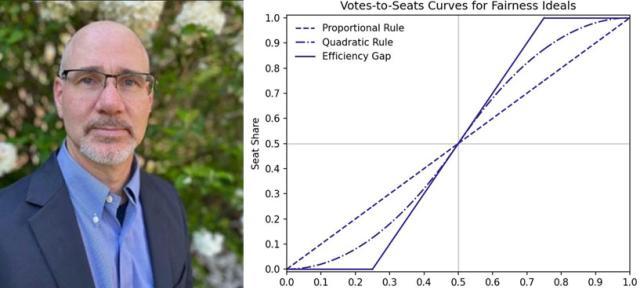Hampshire Math Professor Jeff Barton Shares Research on Partisan Gerrymandering

Barton’s new coauthored paper appears in the journal, Electoral Studies. He presented the primary concepts during an open session at Family & Friends Weekend.
The academic article, titled “A decomposition of partisan advantage in electoral district maps,” which Barton wrote with economist and political scientist Jon Eguia at Michigan State University, explores four contributing factors to the partisan advantage in a map of electoral districts: “the fairness notion used to evaluate the map, political geography, rules on redistricting criteria that the map must meet, and the discretionary choice of which specific map to adopt.” This research builds on years of Barton’s work at the intersection of mathematics and political science through which he studies measures of fairness in relation to partisan gerrymandering.
On the Saturday afternoon of Family & Friends Weekend, Barton distilled and presented his work in the West Lecture Hall as an open class. He highlighted some of the many ways partisan gerrymandering can be measured in district maps, demonstrating why it is such a difficult issue. Attendees, which included alums, friends, parents, and Barton’s current students, had the opportunity to plot their own “congressional maps” on worksheets with square grids of green and purple parties, representing their shares of votes and seats, which illustrated how easily certain outcomes can be determined with bias.
He showcased the way different approaches unequally favor one party of another in a bipartisan environment. The goal, Barton explained is to “not favor or disfavor” any political party, but this very issue raises the question of how fairness is defined. Ultimately, through mathematical modeling of three possible ideals of fairness — Proportionality, the Efficiency Gap, and the Quadratic Rule — Barton proved the latter to be most effective. He explained his and Eguia’s new mathematical standard for resolving the partisan advantage, and took time afterward to answer questions from the audience.
> Read the full paper



